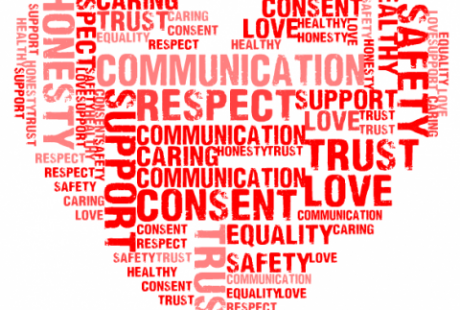Peers Building Justice: Defining Healthy Relationships through a Social Justice Lens
With Healthy Relationships we also have to take into consideration how our social locations and the identities that we hold can reflect healthy/unhealthy relationships. This is a list of some key elements of what a healthy relationship looks like with an anti-oppressive lens.
- Communication: Understanding your partner(s) social location can change the way they communicate (how and where they grew up, how they were raised, personality, family etc). Being honest and open about your views, feelings, thoughts, etc are really important. We also understand how society has put pressure on certain genders to hold back emotions. Communication is key to a healthy relationship so work with your partner(s) and start talking about what’s going on.
- Active listening: Listening is one thing, but active listening is completely different. Listening is when someone is saying something and you are hearing their voice/words or body movements, but not their message. Active listening is fully focusing, concentrating, understanding, and responding what the other person told you.
- “All-way street”: All people need to treat each other with a “love ethic” (similar to the Golden Rule). Bell Hooks explains a “love ethic” as:
“To live our lives based on the principles of a love ethic – showing care, respect, knowledge, integrity, and the will to cooperate – we have to be courageous.Learning how to face our fears is one way we embrace love. Our fear may not go away, but it will not stand in the way. Those of us who have already chosen to embrace a love ethic, allowing it to govern and inform how we think and act, know that when we let our light shine, we draw to us and are drawn to other bearers of light. We are not alone.”
- Empathy: It is truly important to feel WITH someone. Sympathy and Empathy can be mistaken as similar, but they are not. Sympathy is when you feel sorrow, pity, sadness, etc for the troubles or hardships that another person faces, but empathy is truly feeling for them, putting yourself in the other person’s shoes.
- Respect each other: Respecting each other means we are respecting our boundaries and that of our partner(s). It means that we are taking into consideration all of our privileges and where we are not privileged. Making sure we respect where they are coming from. Respecting their decisions, respecting their being, respecting their passions — and that can look different for everyone. Check in with your partner(s).
- Love: Love yourself. Love is all the factors we have listed and more. Love is defined by the beholder and love is everything healthy. You define love.
- Trust: It is important to trust your partner(s). When you trust them, you feel confident. You feel sure about what they are saying or doing. We can feel trust in our bodies and know when we are being lied to. When you lie to your partner(s) that can create an unhealthy relationship. If you can’t trust your partner(s) ask yourself why? And communicate your thoughts/feelings to them. Be honest with yourself.
- Be Supportive: Supporting your partner(s) is supporting their process. Its being there for them. When all partner(s) encourage each other to be the best person they can be! Support is given and received.
- Being able to share ideas and feelings in an open way: It is a great feeling when you know you can share your feelings and ideas with your partner(s) and know that they are going to respond with a love ethic. We know that human beings don’t agree all the time, and that’s fine, as long as you don’t judge or put your partner(s) down.
- Being able to communicate and resolve problems together: To be able to collect your thoughts, describe your feelings, and letting your partner(s) know when you don’t feel comfortable with a situation or a personal matter. Allowing their to be space to actively listen, ask questions, and empathize. If there needs to be space before resolving an issue communicate that need. Acting on violence is abuse and will never be accepted.
- Relationships are a roller coaster of emotions, and it is okay: People will have emotions with any and every relationship: (will feel sad, angry, jealous, etc) and how you react to your emotions can be either healthy or unhealthy. The key element in any relationship is to feel happy most of the time with your partner(s) and with yourself.

